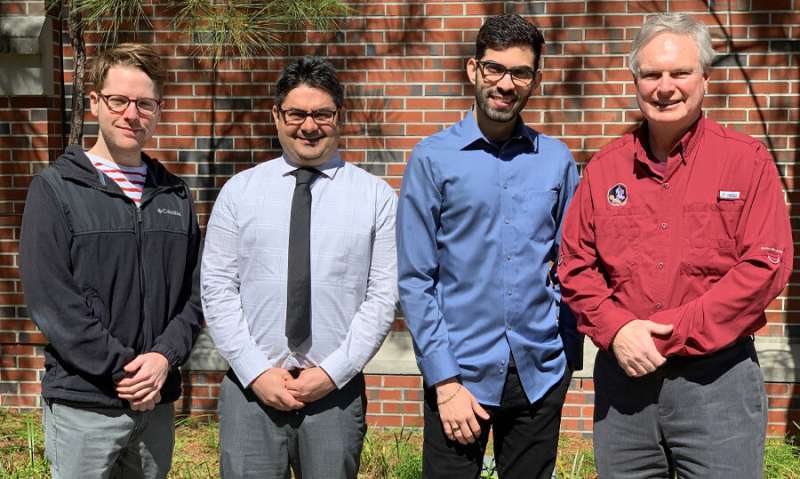Researchers discover new genetic variants that cause heart disease in infants

Florida State University researchers working in an international collaboration have identified new genetic variants that cause heart disease in infants, and their research has led to novel insights into the role of a protein that affects how the heart pumps blood. It is a discovery that could lead to new treatments for people suffering from heart disease.
In two separate papers, Jose Pinto, an associate professor in the College of Medicine, and P. Bryant Chase, a professor in the Department of Biological Science, worked with doctoral students Jamie Johnston and Maicon Landim-Vieira to explore a disease that caused the heart to pump with too little force. Their work was published in the Journal of Biological Chemistry and in Frontiers in Physiology .
The researchers discovered new interactions within parts of a protein called troponin. Troponin has three parts—troponin C, troponin I and troponin T—that work together to regulate the heart's pumping of blood. The FSU researchers uncovered interactions of troponin C with portions of troponin T that can decrease the force of the heartbeat, something scientists had not previously noticed.
"All of these proteins, they work like an orchestra," Pinto said. "What is the main thing for an orchestra? To be in harmony, in balance. You need to have a good balance and you need to be in harmony, otherwise you will not produce good music. If one of these proteins is not in sync with the other proteins, you will not have your orchestra in harmony or balanced well, and then that will lead to the disease."
Most previous work had focused on interactions between troponin C and troponin I, or between troponin T and another protein called tropomyosin. The new interaction between troponin C and troponin T is "an interaction that will modulate how much force the heart generates in each heartbeat," Pinto said. "If you increase the number of these interactions, most likely you decrease contraction of the heart, and if you prevent these interactions, very likely you increase the force of contraction in each heartbeat."
But science sometimes leads to more questions than answers. A related study by the same FSU researchers reported a new combination of genetic variants in a different part of troponin C that also caused heart disease in infants. Rather than uncovering new interactions among the parts of troponin, this study led researchers to conclude that there must be an unknown role for troponin, possibly in the cell nucleus, Chase said.
In that research, DNA sequencing showed that a mother and a father had different variants that both affected the troponin C protein. Although their cell function was altered in such a way that researchers expected them to have heart problems, they did not show signs of heart disease. Their children, however, had both variants, and though their cell functioning appeared to be more normal, they developed deadly heart disease.
"Some experiments provide a lot of immediate insight, but other times we find out that we just don't understand everything that we think we do," Chase said. "As much as we've learned, as much as we do understand, there's a lot more that's unknown. And it's those times that can eventually lead to brand new, unexpected insights."
Understanding the interactions between the parts of the troponin protein and also troponin's various roles in heart cells will help guide new treatments for heart disease, both for the disease caused by the specific genetic variants the researchers discovered and for heart disease in general.
"These diseases are caused by seemingly small changes in the DNA," Chase said. "There are genetic technologies to reverse that, to introduce the common DNA sequence, but applications of genetic technologies to human disease are in their infancy and there's not a surefire and ethical way to apply changes in the genome to all the heart patients who could benefit from it. I'm sure there will be ways to correct genetic variants for a number of diseases, but the medical community is only just beginning to find out how to do that safely for people."
More information: Jamie R. Johnston et al, The intrinsically disordered C terminus of troponin T binds to troponin C to modulate myocardial force generation, Journal of Biological Chemistry (2019). DOI: 10.1074/jbc.RA119.011177
Maicon Landim-Vieira et al. Familial Dilated Cardiomyopathy Associated With a Novel Combination of Compound Heterozygous TNNC1 Variants, Frontiers in Physiology (2020). DOI: 10.3389/fphys.2019.01612




















